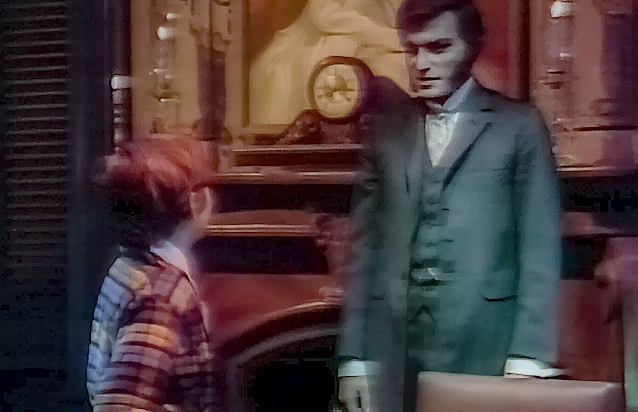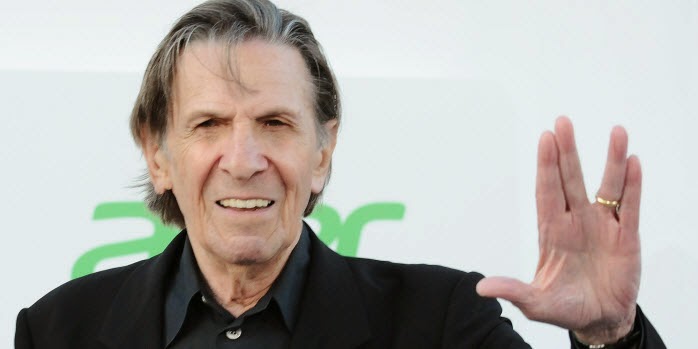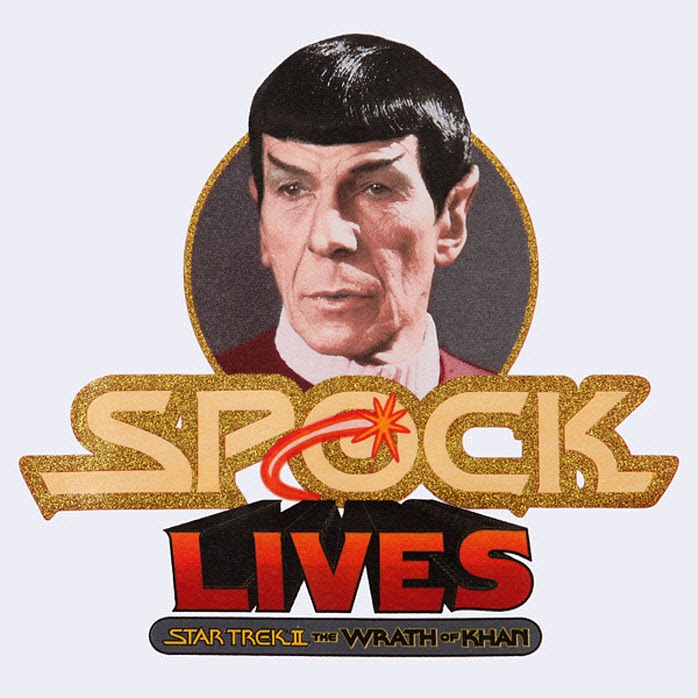By PATRICK McCRAY
Taped on this day in 1969: Episode 767
When Jamison dreams of the death of his own grandson, will his recollections teach Barnabas the ultimate truth of Quentin Collins? Quentin Collins: David Selby. (Repeat; 30 min.)
Jamison dreams that David’s morbid birthday party is conducted by relatives who are cruelly unmoved by the actual commemoration of his living death. Only the ghost of Quentin provides David with a sense of belonging as he contemplates the transition to the world of the departed.
Even if he had not appeared in the first shots of the first episode… even if he had somehow appeared only, by a twist of time, as late as season 3 of Discovery… we all know that Star Trek is Leonard Nimoy. His character, Spock, is Star Trek, and his performance is of the measured, intellectual integrity and focused passion that can be recognized in any of his finest colleagues in the franchise. Star Trek, as we know it, is the water-breaking stone of Nimoy. Everything else? Ripples. Not insignificant. Even in the stone’s absence, the ripples spread ever wider as a growing/fading testament to its impact.
This lionizing is not meant to imply anything wanting in his cast mates. They didn’t get that character. Their artistry and skill are as honed as Nimoy’s. Maybe more. But there can only be one Spock.
Were Mr. Nimoy still alive and reading this, I’m sure he’d be mortified at the suspiciously bulbous compliment. Humiliating you is not on purpose, Theo. Go easy. I paint what I see.
It is with no small consideration that I state that Dark Shadows finds its Nimoy in David Selby.
That is a difficult truth to write. It’s also a savagely unfair analogy. As with Nimoy and Spock, no one else (except for Thayer David) played Quentin. So, I’m sorry. Jonathan Frid did the heavy lifting. He blazed the trail, laid the groundwork, and participated in countless other cliches. But, the airwaves made safe for a feral other, David Selby and Quentin stride into the story with both startling drama and the noble glide of a gracious poet from the heart of West Virginia. The audience, writers, ensemble, and very Zeitgeist were prepared for this character. Quentin is the apotheosis of the horror hero on Dark Shadows, which is to say, all horror heroes. He is a flawed man who prizes expedience and operational fictions. Thus, the larger society has no need for him. But those qualities don’t represent the man within the beast-before-the-beast, and we know it. Yes, he is frightening as a ghost. And yet the examples of Burke, Barnabas, Adam, and even Nicholas Blair and Angelique, to various degrees, have taught us to just… wait… a few episodes. These so-called monsters are often kind people are made monstrous by the abuses of love. Usually, they love in too-great abundance, their hearts and deeper passions unable to color within the lines established by Polite Society. Their transformations into horrors are not necessarily representative of some inner impurity becoming manifest on the surface. Instead, the creatures they become are inflated versions of society’s opinion of them.
The Dark Shadows story, then, is Quentin’s story. It’s Barnabas’ story. A good man has debatable flaws that glare when looked at through the eyes of ruling class pedants. Especially when those passions lead him into arms and cultures of the serving class, or, worse, decidedly un-Anglo, Eastern European immigrants. Pressured by imposed guilt or the terror of starving to death, these men return to the family fold only to find that those alternative communities have something to say. Barnabas’ and Quentin’s affections don’t legitimize these cultures… they were already legitimate. But their affections are long-overdue acknowledgements. And not just momentary. Barnabas loved Angelique. Quentin loved Jenny.
The alternative class curses both men in ways that place their inner differences into the spotlight. After all, those classes are defined by their differences. Now, the ruling class will be unable to hide their allegedly sinful natures. Barnabas can hide that he sapped Angelique’s hope and optimism. Let’s curse him as something famous as a parasite. Quentin barely hides his animalistic lusts? Again… you see where this is going. Make him, literally, a wolf.
Both conditions are temporary. Both men grow up while growing away from their roots. Barnabas falls in love with Angelique. Quentin loses a child he never knew and finds the strength to lead the family with his curious mix of guile and gallantry. And as a romantic, Quentin goes beyond the obscenity of marrying an immigrant to falling in love with a woman who never even existed except in a bohemian artist’s imagination.
Selby captures all of this while never delving into a weary lecture on class warfare. Frid is marvelous, yes, but Barnabas’ affected refinement and mid-Atlantic accent distance him from viewers as too European. Selby is ripely American. Part gentleman, part hell-bent-for-leather frontiersman. Casting a man of the south was a quiet masterstroke by Dan Curtis, for where else but in the American south do we find the fusion of these national identities? Selby represents the very best of southern culture. Joy. A charm that comes from authentic bonhomie. Quiet thoughtfulness. Most of all, cautious friendliness — hardly a Collins trait. There’s Faulkner’s lyricism and Williams’ poignance and Poe’s dreamy irony and Twain’s irascible honesty in Quentin… and in David Selby, himself. All bound by honest benevolence. Once he tells Beth she’s still beautiful, which she is-but-never-hears in a world of prim Judith’s steaming chamber pots and Edward’s careless cigar ash, he’s our guy. He’s the answer to Liz’s isolation, Roger’s repressed rage, Joshua’s hypocrisy, and so on. Naturally, he must suffer for it.
This is art, after all.
Both Barnabas and Quentin are good men who stand apart from their families without abandoning them. There is no more ringing evidence than the regard with which they are held by adoring children. Sarah, Jamison, and Nora have no social preconceptions to cloud their honest opinions, and they see and love the truth in these men like no other.
In 767, Jamison naturally trusts Barnabas with his darkest nightmare. In it, the ghost of Quentin reaches out again to that other outstanding critic of Collins social artifice, David. Yes, they are destined to be ghosts to their families, but they will have each other. Brothers in truth and love, separated by centuries, dreams, and death, itself. In his performance with David Henesy, David Selby shows an effortless loyalty, sincerity, and love that is wholly devoid of the condescension normally reserved for speaking with children. Quentin may be a wolf without a pack, but he is their guardian, nevertheless. And what is a wolf but a liberated dog? And I refer to a dog not as a servant, pet, or a beast, but as humanity’s kindest, most loyal, and intuitive companion. Those who have witnessed the beguilingly alien wisdom of these often majestic compatriots know that the comparison is the highest compliment. It is a rare human who matches their unflagging virtue; they are too easily written off as mere animals.
Quentin is a wolf at heart. In the very best ways. As painted with tireless wit and sensitivity, Selby embodies those noble virtues with the knowing voice of an author and artist. It takes a surreal dream sequence, replete with mocking puppets and the Collinses at their most sadly, honestly calloused, to let Selby crystalize what makes him different. What makes him American. What makes him the friend, guide, and troubled companion that Dark Shadows was destined to impart and always was.
This episode hit the airwaves on June 3, 1969.



